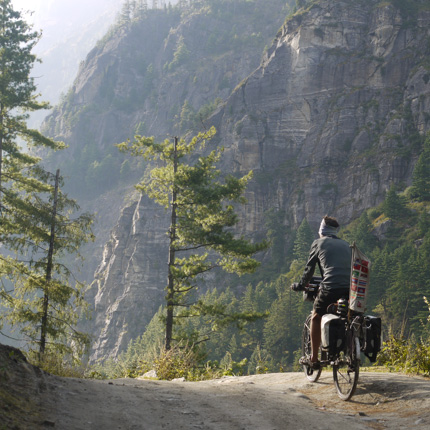You’ve written about the cognitive dissonance created by the romanticised idea of adventure. What do you mean by this?
It’s an idea that centres on the concept of the outdoors as an “escape” from everyday life. When I first started heading out hiking and wild camping, I was in my second year of university, and my ventures up to the Scottish highlands on the National Express night service were fuelled by a desire to get away from the city, deadlines, or relationships. But as I became increasingly actively involved in environmental issues, I found that I was starting to use my time outdoors as an antidote to the climate grief I was experiencing back at home. The more I learned about the state of the planet, the further I would travel to find the “wilderness” I hoped could distract me - but it never did. Ultimately, I’d divided my life into “inside” and “outside”, and the knowledge that I could always run for the hills - literally - lulled me into an endless cycle of apathy.
This indoor/outdoor divide is something I feel the outdoor industry capitalises on. The notion of escape sells well - especially in a society which places such value on labour and productivity - but it’s artificially created, and in the face of a climate emergency it can be destructive. As long as we consider nature to be our playground, we’re actively removing ourselves from the fight for environmental and social justice - and whilst we’re outside playing, there are executives in the fossil fuel industry lobbying to open up the Arctic for drilling.
Generally speaking, how complicit are outdoor brands in this phenomenon? And are brands getting better?
At the risk of sounding cynical, I’d say that brands aren’t just complicit, they are - for the most part - reliant on the idea of nature as a playground. Don’t get me wrong, there are lots of brands that I love to support, and I love learning about gear and innovative materials. Simultaneously though, it’s important to remember that outdoor brands are just components of an industry which, like any other, is fuelled by a cycle of production, consumption and profit. Much of the outdoor community likes to distance itself from even the slightest notion of “fashion” - but our outdoor gear is just clothing, made by human hands from resources taken from the earth, and returned a few years later as waste. The only real difference between even the most technical jacket and the blazer you wear to the office is the situation the item is worn in, and the materials used, and the majority of outdoor brands work similarly to mainstream clothing outlets - each season brings new colours, graphics, or designs. Many brands are taking steps to decrease their environmental impact - phasing out PFCs, tracing down, committing to organic cotton - and that’s encouraging, but for the most part, it’s not enough.
We have less than ten years to prevent catastrophic climate breakdown, and there are still brands refusing to part with environmentally damaging practices for the sake of technical performance, and trying to offset that by launching a new, “green” product line. Good quality, reliable gear can save your life in the mountains, but it won’t protect you from a burning planet - and even the best mountaineering shell is useless when there’s no ice left to climb. The outdoor industry is in such a good position to lead in the development of sustainable business practice - it would be great to see all brands wholeheartedly throwing all of their resources and energy into creating change.
Are there any outdoor brands you feel are exemplary?
This is tough - on one hand, I’m a big advocate for imperfect environmentalism, and positively engaging with brands who are attempting to do better, even if they aren’t quite perfect yet. On the other hand, we are in the midst of a climate emergency; every day, we’re facing biodiversity loss, water shortages, forest fires. We desperately need to change the ways we design, produce, and consume things, and if brands - especially those founded on a love for the outdoors - aren’t willing to ditch ‘business as usual’, perhaps they shouldn’t be in business at all.
There are some outliers though! I love to support brands which have built themselves around strong environmental principles - Swedish brand Klattermusen, who create beautifully designed and durable mountaineering and trekking gear, or Findra, who craft the softest merino base layers up in Scotland. Paramo, who lead the way in producing PFC-free waterproofs. And of course Firepot and Outdoor Provisions, both of whom have rejected the convenience of single use packaging in favour of compostable alternatives.



















